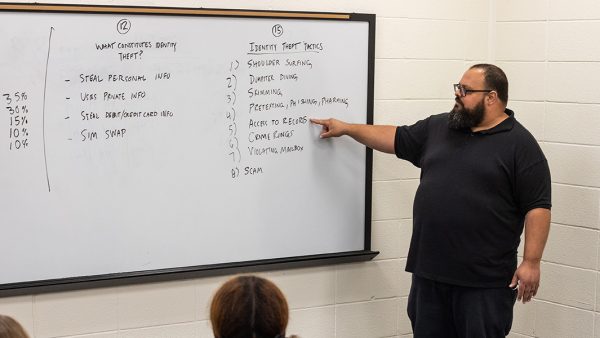Students who major in business can develop the essential skills needed to flourish in a business environment. Students are exposed to a variety of perspectives through hands-on learning, case studies, guest speakers and professor experiences. Critical thinking, leadership and team building are emphasized in the department.
KWU Business students have the opportunity to interact closely with faculty and in the department, drawing upon their experience and expertise not only in the classroom but also in the greater Salina community.
Meet the KWU Business and Accounting faculty here!

Business & Accounting FAQ
Diversity, Equity and Inclusion Statements
The DEI vision for Kansas Wesleyan is to promote a diverse culture of equity, inclusion, integrity, and collaboration that deepens understanding and embraces intercultural and global experiences for students, faculty and staff.
Business & Accounting Department
In the world of business, not everybody is the same. Because of this, the Department of Business and Accounting recognizes diversity as a tremendous strength. The differences in who we are, how we think, how we collaborate, how our past and present experiences
have shaped us, and how we conduct business are valued, leading to an environment of inclusivity. Because businesses are created to provide tangible and intangible products to serve everyone, the Department of Business and Accounting believe in including, respecting, and seeing the value in everyone.
Updated September 2023
Why should I study business at KWU?
Practical education you can use right away!
You will have an opportunity to interact closely with engaging, expert faculty who can assist you and apply their valuable experiences in the business world to the classroom. During your studies, you will develop a broad knowledge of business operations and gain practical applications in your specific field.
You also gain many transferable skills in a variety of career paths. Competencies include: understanding of how organizations operate, enhancing your communication skills (oral and written) and strengthening your analytical and critical thinking, problem-solving and decision making. Plus, interpreting and using financial data, project and resource management and a good understanding of economic fluctuations and other external changes affecting business.
What can I do with this degree?
A business degree from Kansas Wesleyan will open doors. The application-based curriculum exposes you to a variety of business models, emphasizing the importance of adaptability.
In addition to business savvy in accounting, finance, leadership and problem-solving, KWU graduates enter the workforce with a keen sense of their own strengths and an awareness of how to use those sharpened skills to make significant contributions in the workplace. KWU graduates work in accounting and finance, marketing and advertising, retail, investment banking, insurance underwriting, sales, human resources, teaching and more.
Majors
Minors
Masters Degree
About the Business & Accounting Program
The following courses are offered by the Business department:
BUSA 100: Introduction to Business (3 credit hours – Fall)
This course provides students with a broad base of knowledge and information concerning business in the United States. This course will concentrate on the fundamental concepts and principles on which we develop, organize and operate businesses and how business relates to our economic system. In addition, the course will explore business ethics, social responsibility and the impact of global operations.
BUSA 150: Personal Finance (3 credit hours – Spring)
This course focuses on personal financial planning with the objective of making each student aware of their lifetime financial goals and how they may best achieve those goals in today’s complex environment. After completing this course each student should know and understand the basic principles of personal financial success, including financial planning and goal setting, personal taxation, wealth accumulation strategy, cash and consumer credit management, basic insurance principles, basic investment principles and techniques, retirement planning and investing and estate transfer methods.
BUSA 300: Principles of Marketing (3 credit hours – Spring)
An examination of the coordination and control of marketing activities, including marketing segmentation, product development, product management, pricing, distribution channels and promotion methods.
BUSA 301: Principles of Management (3 credit hours – Fall)
The study of the theory and concepts involved in managing organizations. Topics include the study of management functions in planning, decision making, organization and control.
BUSA 310: Business Finance (3 credit hours – Fall)
Analysis and decision making for financial management of a business. The main areas of study include ratio analysis, planning, working capital management, capital budgeting, financial risk and leverage and the features of various forms of financial sources and markets. Prerequisites: ACCT 203, ACCT 204 and BUSA 219.
BUSA 317: Business Law I – (3 credit hours – Fall)
A study of the legal system and rights between business actors. This course will cover the court system and alternative dispute resolutions, torts and crimes, and the elements of contracts and commercial transactions.
BUSA 318: Business Law II – (3 credit hours – Spring)
A study of business organizations and employment law. This course will cover sole proprietorships, partnerships and various corporate entities. Agency and employment laws will be covered as well as creditor’s rights, government regulations and property laws.
BUSA 322: Human Resource Management (3 credit hours – Spring)
This course is a basic study of personnel topics such as employee motivation and satisfaction, job analysis and design, human resource planning, employee selection, training and evaluation, administration of wages and benefits and labor relations.
BUSA 338: Operations Management (3 credit hours – Spring)
This course provides the student with an understanding of how to effectively manage and improve the operations processes of a business, including production, materials and product purchasing and inventory control, logistics management (receiving, warehousing, picking and transporting materials, goods, and services), order processing and follow-up customer service. Prerequisites: BUSA 219 and BUSA 301.
BUSA 355: Legal Aspect of Business (3 credit hours – Fall)
An introduction to the legal environment in which businesses operate. Considers the institutions and processes related to business law and the major frameworks of private and public law, including the legal system, contracts and commercial transactions, business organizations and relationships, torts, crimes and regulatory law.
BUSA 360: Business Communication (3 credit hours – Fall and Spring)
This course is designed to prepare a business student to communicate more effectively, emphasizing communication through memoranda, letters and written reports. Preparation of oral communication, in conjunction with presentation of oral reports, will be taught to students. Students will examine computer applications that aid in effective internal and external business communication. Prerequisites: ENGL 120, ENGL 121, and COMM 130
BUSA 405: Business Finance – (3 credit hours – Fall)
Analysis and decision making for financial management of a business. The main areas of study include ratio analysis, planning, working capital management, capital budgeting, financial risk and leverage, and the features of various forms of financial sources and markets. Prerequisites: ACCT 203 and ACCT 204
BUSA 445: Strategic Management (3 credit hours – Spring)
This course integrates the required business, accounting and economic courses through the study of objectives of the firm, overall policy and strategy formation and administration. Both oral and written analysis and solutions of several major cases are the heart of the course. Prerequisites: ACCT 203, ACCT 204, BUSA 300, BUSA 301 and BUSA 405
BUSA 450: Business Leadership and Ethics (3 credit hours – Fall)
This course considers the role of the individual in the contemporary American business community. Course topics include the historical, ideological and ethical origins of business along with the political, social and environmental impact of business.
BUSA 460: Internship in Business (2-8 credit hours – On demand)
This course offers an intensive field experience with a community organization. Placement will be based on the student’s career orientation. Prerequisite: Departmental approval and satisfaction of entry criteria where applicable. See Internship under Alternative Means to Academic Credit for a more detailed description.
BUSA 485: Business: Special Topics (3 credit hours – On demand)
A focused investigation into a selected area(s) of Business at the upper division level that will include such topics as advertising, investments or entrepreneurship in small business.
BUSA 490: Independent Study (Variable credit – On demand)
Independent Study consists of research, readings, other scholarly investigation or creative work at the upper division level. See Independent Study under Alternative Means to Academic Credit for a more detailed description.
ECON 201: Introduction to Economics (3 credit hours – On demand)
An introduction to basic macro and micro economic principles. This course will address issues of scarcity, economic modeling, opportunity cost, supply and demand, consumer choice, profit maximization, competition, labor markets, fiscal and monetary policy, aggregate demand and aggregate supply and international trade.
ECON 205: Principles of Macroeconomics (3 credit hours – On demand)
An introduction to economic principles, problems and policies with emphasis on national income theory, employment, monetary and fiscal institutions, economic growth and economic relations between nations
ECON 206: Principles of Microeconomics (3 credit hours – On demand)
Emphasis is on the price mechanism, product and resource markets, market structures and their social welfare implications.
ECON 286: Special Topics (3 credit hours – On demand)
ECON 485: Special Topics (3 credit hours – On demand)
Degree Requirements and Suggested Course Sequence
B.A. in Accounting – 48 credit hours
The student will complete all of the following courses:
- ACCT 203 Financial Accounting – 3 credit hours
- ACCT 204 Managerial Accounting – 3 credit hours
- ACCT 301 Intermediate Accounting I – 3 credit hours
- ACCT 302 Intermediate Accounting II – 3 credit hours
- ACCT 316 Individual Income Tax – 3 credit hours
- ACCT 400 Cost Accounting – 3 credit hours
- ACCT 402 Advanced Financial Accounting – 3 credit hours
- ACCT 415 Auditing – 3 credit hours
- BUSA 219 Quantitative Business Applications – 3 credit hours
- BUSA 300 Principles of Marketing – 3 credit hours
- BUSA 301 Principles of Management – 3 credit hours
- BUSA 310 Business Finance – 3 credit hours
- BUSA 317 Business Law – 3 credit hours
- BUSA 360 Business Communication – 3 credit hours
- COMP 434 Management Information Systems – 3 credit hours
- ECON 201 Introduction to Economics – 3 credit hours
- MATH 120 College Algebra or higher – 3 credit hours (in fulfillment of Liberal Studies Requirement)
B.A. in Business — 42 credit hours
The student will complete all of the following courses:
- ACCT 203 Financial Accounting – 3 credit hours
- ACCT 204 Managerial Accounting – 3 credit hours
- BUSA 219 Quantitative Business Applications – 3 credit hours
- BUSA 300 Principles of Marketing – 3 credit hours
- BUSA 301 Principles of Management – 3 credit hours
- BUSA 310 Business Finance – 3 credit hours
- BUSA 317 Business Law – 3 credit hours
- BUSA 322 Human Resource Management – 3 credit hours
- BUSA 338 Operations Management – 3 credit hours
- BUSA 360 Business Communication – 3 credit hours
- BUSA 445 Strategic Management – 3 credit hours
- BUSA 450 Business Leadership and Ethics – 3 credit hours
- COMP 434 Management Information Systems – 3 credit hours
- ECON 201 Introduction to Economics – 3 credit hours
- * MATH 120 College Algebra or higher in fulfillment of Liberal Studies Requirements
Accounting Minor Requirements – 15 credit hours
The student must complete all of the following:
- ACCT 203 Financial Accounting – 3 credit hours
- ACCT 204 Managerial Accounting – 3 credit hours
- ACCT 301 Intermediate Accounting I – 3 credit hours
- ACCT 302 Intermediate Accounting II – 3 credit hours
- ACCT 316 Individual Income Tax – 3 credit hours
- Or ACCT 400 Cost Accounting – 3 credit hours
Business Minor Requirements – 18 credit hours
The student must complete all of the following:
- ACCT 203 Financial Accounting – 3 credit hours
- ACCT 204 Managerial Accounting – 3 credit hours
- ECON 201 Introduction to Economics – 3 credit hours
- BUSA 300 Principles of Marketing – 3 credit hours
- BUSA 301 Principles of Management – 3 credit hours
- BUSA 360 Business Communication – 3 credit hours






